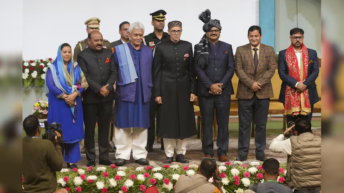|
Listen to article
Getting your Trinity Audio player ready...
|

GIRISH CHANDRA GHOSH (1844-1912) was a brilliant playwright, composer, actor, and director who contributed greatly to propagating theatrical culture in northeastern India. He acquired great popularity in his days. But that’s just a small part of his life story and personality.
His transformation from being a drunkard to a devotee of Sri Ramakrishna Paramahamsa, the saint of 19th century Bengal, has become a legendary and inspirational tale among the blessed lives of people touched by the grace of their Master Sri Ramakrishna. Girish Ghosh was prey to vices like drinking and debauchery, yet his pure love and devotion to his Master turned him into a spiritual seeker, a saint. How did it become possible?
Birth, Personal life & Career
Girish was born on February 28, 1844, in Bagbazar, North Kolkata, West Bengal. His father Nilkamal was an accountant, his mother Raimani was a devout Hindu housekeeper. Girish was the eighth of twelve children. Girish’s mother died when he was 11 years old and his father when he was 14. His older sister Krishnaeshwari who became his guardian could not handle his rebellious nature and got him married to Pramodini Devi at the age of 15.
Although Girish was known to have a great intellect and memory, he failed in school examinations, could not finish his education and became a dropout when he was in class 10. India was under British rule then. Girish Ghosh’s father-in-law helped him find an apprenticeship in bookkeeping in a British company. Around that time he got associated with Ishwar Chandra Gupta, a well-known poet and journalist who inspired him to write songs and plays.
Girish was a voracious reader of classic English literature and became very well versed in English. Later, he became a member of the Asiatic Society and in its large public library he acquainted himself with the itihaasas – Ramayana, Mahabharata, the Puranas and many other Indian ancient texts.
Girish lost his first wife at age 30 and after a few years married again. Unfortunately, his second wife also died after a few years. He fathered 7 children from these two wedlocks, out of which only 2 survived. These misfortunes made him drink and drift, and in his agony, he became an atheist.
At age 36, he became a playwright, He wrote around 80 plays including drama, satires and musicals. In addition, he also penned short stories, essays, novels, poems and songs. They revolved around Puranic stories, Ramayana, Mahabharata, socio-political, historic, religious and patriotic subjects.
Girish founded The Great National Theater, the first Bengali professional theater company, in 1872. In 1877 he staged his first play “Agamani” at The Great National Theatre. Later he also worked in Minerva Theatre and went on to become a manager in Star Theatre where he staged his maiden show “Daksha Jagna” in 1883.
Dramas written by Girish Chandra Ghosh
“Girish Chandra wrote 80 plays on religious, historical and social themes, among them Abhimanyuvadh (1881), Sitar Vanavas (1881), Sitaharan (1882), Pandaver Ajvatavas (1882), Prafulla (1889), Maukulamanjari (1892), Jana (1894), Abu Hussain (1896), Validan (1904), Sirajuddaula (1905), Meer Kasem (1906), Chhatrapati Shivaji (1907), Shankaracharya (1910) Kalapahad, Haranidhi and Vilvamangal Thakur. He also translated Shakespeare’s Macbeth (1893) into Bangla and dramatised Bankim Chandra’s novels Mrnalini, Visvrksa and Durgeshnandini, Madhusudan’s epic Meghnadbadh and Nabinchandra’s poem Palashir Yuddha……For the convenience of actors, he modified the blank verse of Madhusudan into a form known after him as Gairish Chhanda (Girish metre).”
From 1869 to 1912 Girish dominated the Kolkata theatrical scene, trained many actors & actresses and gave them respectable livelihood.
He wanted theater to be a medium for national education and a medium to spread socio-political, religious and cultural ideas. He wrote plays to arouse patriotism and national consciousness of the British oppression of India.
Girish ushered in the golden age of Bengali theater through his pioneering works and was thus referred to as the ” Father of Bengali Theater”.
A short but deep connection to Sri Ramakrishna Paramahamsa
Binodini Dasi was a courtesan who acted in many roles in the Great National Theater under the mentorship of Girish Chandra Ghosh.
On 20 September 1884, Girish staged his play, Chaitanyalila, at the Star Theater in which Binodini Das acted as Sri Chaitanya, a great Hindu – Vaishnava mystic. Hearing about the widely acclaimed performance Sri Ramakrishna himself came to see it. He was moved by the life of Sri Chaitanya, the phenomenal performance, and also blessed Binodini. Sri Ramakrishna went on to see other plays by Girish like the Prahalad Charitam also.
In the first few encounters with Sri Ramakrishna, Girish could not accept him as his Guru. In fact, he regarded him as fake and a fraud. Later his heart melted and was attracted to the Master’s spiritual grace.
Here are some heartwarming conversations between Sri Ramakrishna & Girish Chandra Ghosh (GCG).
GCG: “What is a Guru?”
Sri Ramakrishna: “A Guru is a matchmaker. He makes the appointment between man and God. Then his job is over.”
GCG: “What is a mantra?”
Sri Ramakrishna: “Mantra is the Name of God,”
GCG: “Sir I am a sinner …The very ground I used to sit would become unholy”
Sri Ramakrishna: “How can you say that? Suppose a light has been brought into a room that has been dark for a thousand years, does it illuminate the room little by little, or all in a flash?
Later Girish used to say “ I have drunk so much wine in my life that if the wine bottles were placed one upon the other they would just stand as high as Mount Everest!”
Once Girish Chandra Ghosh saw Swami Vivekananda and Sri Ramakrishna Paramhansa dancing in ecstasy in a congregation. When they came out of that trance he asked: – “Which wine?” “No wine, just divine”, Ramakrishna said.
GCG: “I still have a twist in my mind, tell me what I should do? I know not mornings & evenings, before food or after food hours, how can I remember God as you say “
Sri Ramakrishna: “Then give God the power of attorney. Let him do whatever He likes”
And thus Girish Chandra Ghosh gave the power of attorney to Sri Ramakrishna Paramahamsa.
Girish Chandra Ghosh left his mortal body on 8 February 1912. His last words were: “Master, you have come. Please destroy my worldly intoxication. Victory to Sri Ramakrishna. Let us go”.
“Girish has one hundred and twenty-five per cent faith” – Sri Ramakrishna






Add comment